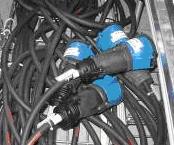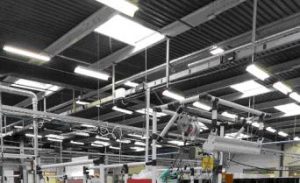Home › Electrical Engineering Forum › General Discussion › Contractors are all cheaters?
- This topic has 19 replies, 4 voices, and was last updated 11 years, 10 months ago by
Anonymous.
-
AuthorPosts
-
2012/10/30 at 11:12 am #10934
Laurent
Participant
My name is Helmut Schmidt, and I am facility manager for our mechanical components manufacturing sites in Germany.I really appreciated the previous post panelbuilders are all cheaters raising right questions on prefabricated solutions versus traditional solutions with lot of cabling. I used a similar slogan in my title as I would like to question in the same way the electrical contractors who, I don’t understand really why, do not seem to always propose the best solution …
Let me explain: recently in my company, we started a new project for a 3rd manufacturing site (5500m²), including on one side production of machine tools and on the other side office area.
In the past, when we built our first 2 manufacturing sites projects, the contractors used cables on cable trays for lighting and power distribution. Now, for this 3rd project, we received quotations from the usual electrical contractors, with lighting and power distribution done the same way, with cables on cable trays. But also, as suggested by a design office, another quotation based on busway solution, quoted by another electrical contactor recommended by this Design Office.
Regarding the electrical distribution (power and lighting), I had heard about busway solution, but I thought it was really much more expensive. But after talking to this Design Office, I realized that I was not fully aware of this technology and its advantages, as I tried to summarize in this small comparison table:
Cable
Busway
Dimensions +-
++
Flexibility —
++
Continuity of service —
++
Material availability ++
—
Price ==
==
I was very surprised, in particular because the busway solution quoted was not at all more expensive! Furthermore, after digging a little, I realized that this solution is far more advantageous for the future management of our factory:- Easiness of evolution of installation. Very useful in my case because we are going to add new machine tools in next months, as and when required by the evolution of volumes to produce
- Reusable, thus more environment friendly. If I well understood I can even re-use in the future the busway products for a new building if we have to move to another site in the future
- Speed of installation. I was said that for installing this is quicker and safer for contractors, as it is prefabricated connections; no mistake possible
Finally, due to the quicker installation, the completed installation is quoted at same price, even though the busway products to purchase seem to be more expensive by 10% in my case. I was very surprised, so I looked for other examples available, and I found an example on the web, showing a busway installation 14% less expensive than standard solution, on the whole installation!!
Until today, I didn’t make a decision yet to choose the contractor suggesting busway, because I feel a bit confused: it seems too good to be true … or are contractors really cheaters?
In fact, I have trouble to understand why electrical contractors would not offer a solution bringing a lot of advantages to their customers, easier to install for him, and less costly overall.
I must be mistaken somewhere. My analysis on Cons & Pros of busways is most probably incomplete … i really need your help to understand!
In my particular project, as suggested by my design office, would you advise me to use busway rather than cable? If not, why?
… and more globally, what are the main reasons why electrical contractors do not propose this type of busway solutions more often?
Helmut
2012/10/30 at 11:18 am #13262Hel-S
Participant@G Fields,
1/ I hear sometimes “busway” and sometimes “busbar trunking”. Usually I reserve “busbar” to busbar in switchboards … how do you make the difference?
2/ You say busbar is used for at least 25 years but when I visit other buildings I don’t see busbar. Why is not used more often in your opinion?
Helmut
2012/10/30 at 12:10 pm #13260Laurent
ParticipantDue to a bug, the 1st comments were not published on the Forum side. You can view these comment here on the blog.
Laurent2012/10/31 at 7:27 pm #13167Anonymous
GuestHelmut
How and when you use it would depend on what you wished to achieve. It is suitable for many, many applications from systems requiring 1000’s of Amps to small power and lighting.
Ideally long straight runs are best suited to it, though not essential. You can have a large header busbar trunking (say 1000A) feeding smaller trunking (say 250A-400A), which in turn could feed still smaller trunking (say 16A)-100A).
Some busbar trunking has additional conductors that can be used to control interfaces.
There is no simple answer to this as how and what you use comes down to familiarity with the product and experience particularly on similar applications.
If you are looking for a flexible installation that changes regularly with the addition of new equipment or relocating of existing it can pay dividends both in speed and cost.
The installation itself can be much, much quicker than installing cables.
Almost anything can be done, sometimes it requires some modification to manufactures standard equipment to achieve exactly what you want, however speaking from experience i can tell you that some of Telemacinuque’s now standard equipment came from modifications requested by a colleague over 20 years ago.
Some busbar trunking is better than others, some is even IP Rate, the busbars being cast in resin.
My advice would be to take on the services of a reputable building services consultant, one of the bigger names, I currently work for WYG (Formally White Young Green), others such as Hoare Lea, BDP will be able to provide a similar level of service.
The best service will come from some one whom has actually designed schemes that use it, re inventing a wheel usually results in problems.
If you require any pointers i will gladly advise you. my mobile number is 07775783663 if you should require to speak to some one.
My colleague at WYG Manchester who is truly proficient with busbar systems is Mike Green, he is currently the technical director and can be contacted on 0161 872 3223.
2012/11/02 at 8:24 am #13166Anonymous
GuestHello,I presume that Busway means use of bare conductors run on insulators.The major cons, are they have to be enclosed in a metal box with required IP protection,there will be joints at direction change overs(Joints are week points),is time consuming(first busway supports have to be fitted all along the route and then busways are run on these supports),extensions have to be planned and necessary provisions have to be made to tap(requires junction boxes to fit into the Busways) and lastly additional cost for materials and installation
2012/11/05 at 7:56 am #13267Anonymous
GuestSome busbar trunking is better than others, some is even IP Amount, the busbars being throw in material.
2012/11/05 at 6:33 pm #13268Hel-S
Participant@B.R.
In my case IP will be IP54 but it is indoor installation.
About supports I suppose you need also for cable to fix trays. For sure we will have provisions of junction boxes for extension, have you used busways for your own installation? do you recommend it?
Helmut2012/11/05 at 6:35 pm #13269Hel-S
Participant@Servo Voltage
What you mean by better, for installation or usage? what are your advices?
Helmut2012/11/22 at 12:43 pm #13213Anonymous
GuestThe major cons, are they have to be enclosed in a metal box with required IP protection,there will be joints at direction change over
2012/11/26 at 10:07 am #13214Hel-S
Participant@raj,
All busways I’ve seen have metal box with or without color, what solution do you suggest ?2012/11/29 at 5:25 am #13288Anonymous
Guestwhy are contractors cheaters?
is all business man cheaters?
Shop Owners?
Cheaters are people that are not doing nothing but want to take your money away,contractors on the other hand have to work hard and prove their work before they get payed.
but remember there is contractor and there is fly by night
so don’t put every one in the same basket.2012/11/29 at 7:23 pm #13270Anonymous
GuestIt’s not fair to say contractors are cheaters, the problem is the accountants. They would want the bus solution at the cost of cable but install price of bus.
Another problem is that the plant engineer may design to meet existing technology so if its been wired for 10 years and you start to add on do you bus or do you wire? Is it a development project and what happens when you decide that the project is no longer needed because we have a bigger idea (requiring bigger loads)?It is quite easy to run temporary installed cabling that could be hung later.
No easy answer to your problem but don’t call contractors cheaters as contractors have to complete a task before payment. The one thing I will say is that contracts are poorly defined and audited/supervised
2012/11/30 at 5:50 am #13274Anonymous
Guesti agree
also the problem is the design is not complete and no drawings available,still the contractor is requested to do programs and erect the plant without no proper information.
2012/11/30 at 10:42 pm #13275Anonymous
GuestI agreed too, while engineers design the job based on specs. and not price, accountant are not trianed to provide engineeering solutions but signs the cheque.
2012/12/03 at 10:06 am #13278Anonymous
GuestAll busways I’ve seen have steel box with or without shade, what remedy do you recommend …..
-
AuthorPosts
- You must be logged in to reply to this topic.

